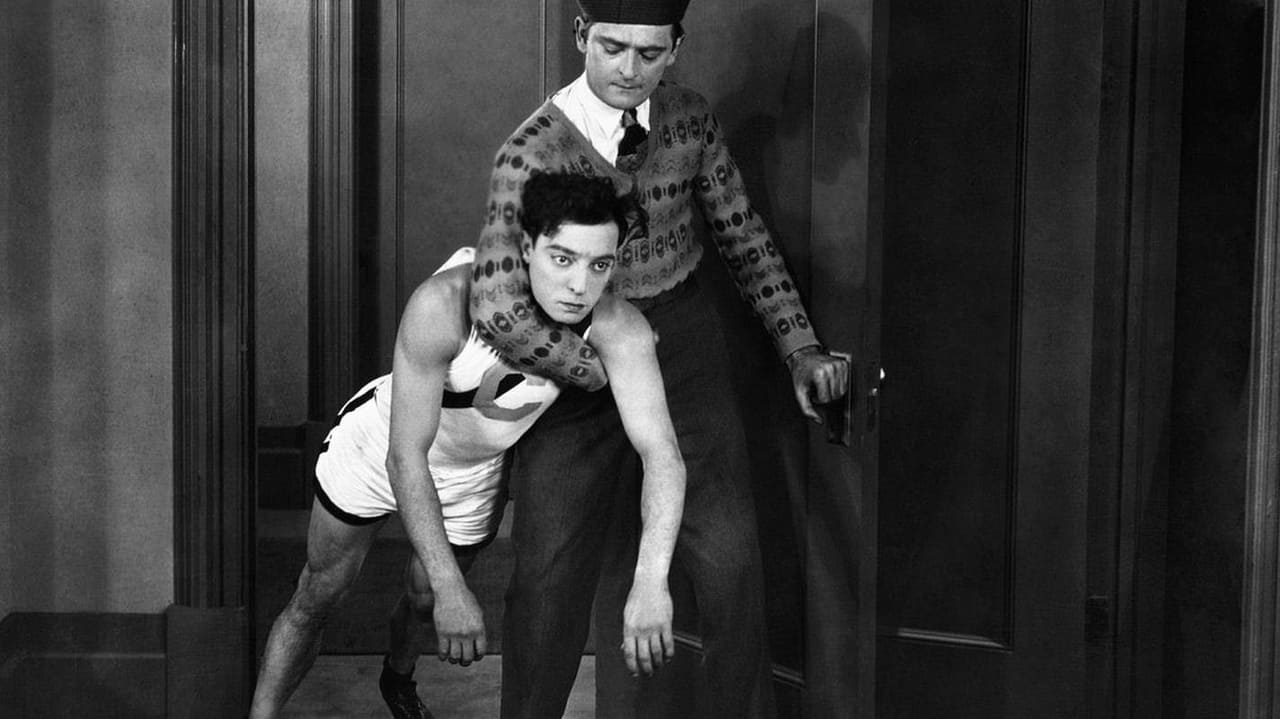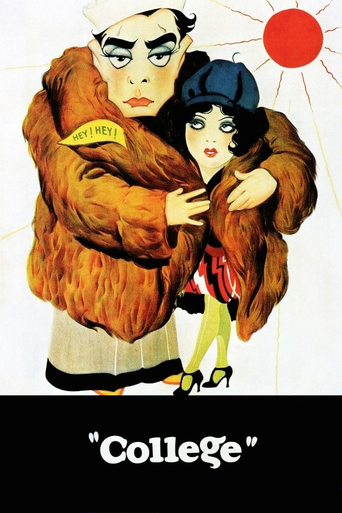

"College" is essentially about Buster Keaton's efforts to win his lady fair (Anne Cornwall)....the hard way.The film opens at Buster's high school graduation (Keaton was actually a little too old to play an eighteen year old at the time). Buster it seems is an academic who condemns athletes. Buster's rival (Harold Goodwin) laughs at Buster's ideas.The next fall the trio enroll at Clayton College. Buster has vowed to impress his girl by trying out for various athletic teams. He "plays" baseball and enters several track and field events with disastrous results. Finally the Dean (Snitz Edwards) orders the rowing coach to install Buster as the rowing team's coxswain. Buster instills his own methods in the race and...........Although the story is a simple one, boy loves girl, boy loses girl, boy wins girl, there are several memorable comedic moments. When Buster and his mother (Florence Turner) attend the High School Graduation, they are soaked in a downpour. As Buster delivers his speech, his newly bought suit begins to gradually shrink. He takes on two jobs to help pay his way, first as a soda jerk where he pales in comparison to his fellow employee, and later as a "colored" waiter in black face. Remember, this was 1927 and many vaudeville performers of the day used black face in their acts, so it was not out of the ordinary for Keaton to do so as well.Buster's baseball antics are hilarious as he tries to play third base. In the track and field segments, he fails at shot put, javelin, pole vaulting, hammer throw, hurdles and racing with equal aplomb.Buster's rescue of his girl from his nasty rival is mile a minute entertainment as he races to her aid. The finale of the film based on the "'til death do you part" scenario was I thought, a little unusual.This was I believe, the first of Keaton's films in which he was not credited as Director on screen.
... View More"In films that combined comedy with extraordinary physical risks, Buster Keaton played a brave spirit who took the universe on its own terms, and gave no quarter" (Roger Ebert) Among many silent movies which we are lucky to see these days (and which have not been lost after all), COLLEGE by James W. Horne and Buster Keaton was a real surprise for the audiences in my town's movie theater. Seeing silent comedies on the big screen exceptionally proves to be an uncommon experience. I think that there are hardly any viewers who may leave the cinema disappointed. Simply because the humor of COLLEGE seems to have stood a test of time combining comedy features with some notions of what a good movie entertainment is all about. What is it about? It is to amuse us, to bring relief, to educate a bit being at the same time not too tense. Roger Ebert, in the quotations that marks the beginning of my review, nicely observes that Keaton was able to execute tremendous physical abilities, which makes his films interesting even today. That is particularly noticeable in COLLEGE and calls our attention throughout. His character of young Ronald who does anything to make himself attractive to Mary (Anne Cornwall), the girl he loves, executes much of timeless humor. Combined with wit, the effect is outstanding: awe and laughter go in pairs and substitute each other. Who can forget the hilarious scenes on the sports field? How can you remain indifferent to his efforts? A lot of such moments when he moves like a true athlete do not allow you to concentrate elsewhere. That makes COLLEGE vibrant and surprising.Keaton's character is quite different than Charlie Chaplin's roles. He is quite a flamboyant young man who makes us laugh but ALSO makes us identify with his dilemma. Just to note what there is at the heart of his efforts: to win the heart of his 'sweetheart.' Consider the scenes with his mother (Florence Turner) when the humor is somehow directed towards his umbrella but also supplied with a clue of such a young man's personality, his dealing with the world and his dealing with simple situations. When he is in the arms of his Mary at last (the moment that he reaches thanks to extraordinary pains taken), it is a truly genuine moment, a moment of a dream fulfilled...expressed in the face of a performer.Among the supporting cast, Snitz Edwards is fabulously funny as the Dean, the old bachelor who only claims to be indifferent to a woman's love. To draw a humorous conclusion, COLLEGE is a light hearted entertainment which, though it is silent, does not let you resort to silence. Having seen it, you still feel a desire to share your thoughts with other people. A gem of its time!
... View MoreWhile this may seem a rather lightweight effort considering it came in the same year that produced 'The General (1927),' 'College' is an excellent little film in which Buster Keaton exploits the endless slapstick possibilities offered by sporting activities. Keaton plays Ronald, an unpopular bookworm whose public condemnation of athletics leads his girlfriend (Anne Cornwall) to dump him in favour of a more physically-capable jock (Harold Goodwin). In an attempt to win back the love of his life, Ronald enrolls himself in college and tries his hands at every sport in sight, with hilarious consequences. The two preceding sentences pretty much summarise the entire film. However, this inkling of a narrative is more than enough to open up a vast range of entertaining gags, and Keaton snatches a laugh at every opportunity.How do I begin to list my favourite moments from 'College?' Though some have complained of the repetitiveness of the sequence in which Keaton tries every athletics activity in the book, I thought it was the highlight of the film. The scenes follow a very strict comedic routine: first we see how it is supposed to be done, then we see Ronald's absurdly inept attempt. Wash, rinse, repeat; this time with a completely different sport. Of course the routine becomes somewhat predictable, but Buster Keaton is always the uncertain variable. We don't know how his next effort is going to fail, but we know it is, and that it's going to be a spectacular failure. Ronald is a hopeless case, but you can't deny that he's got heart. Whether he is being out-sprinted by a pair of young children, falling short of the long-jump sandpit, snapping a pole-vaulting stick in half or planting his face two feet underground after clearing the high-jump bar, he is always courageous enough to get up, brush himself off and try again.I've read that Harold Lloyd explored similar territory two years earlier with 'The Freshman (1925),' a film I haven't seen yet, so that one's probably a good film to look up if you, like me, enjoyed this one. It is also believed that there was originally a sequence showing Ronald's attempts to play American football, though this was ulimately cut to avoid comparisons with Lloyd's movie. Additionally, I was interested to read that Ronald's pole-vault through the window was one of the few times in Keaton's career that he didn't perform his own stunts. I'm certain that the danger-level was definitely not the problem {anybody who's seen 'Steamboat Bill, Jr. (1928)' will attest to that}, but pole-vaulting must have been one activity that he simply couldn't pull off. I don't blame him.
... View MoreHere's a silent treat from eighty years back.Buster Keaton plays Ronald, a boy who graduates from high school.He's a bookworm and doesn't care too much of sports.That's why he isn't too much liked.He would like to be liked at least by one person, Mary Haines (Anne Cornwall).So when he goes to college, he starts trying in different kind of sports.Maybe that way he will have Mary instead of his rival, Jeff Brown (Harold Goodwin).But Ronald notices soon he's a failure in sports as he is in almost everything else.James W.Horne is mentioned as the director of College (1927) but Keaton probably did most of the job.The movie's filled with amazing gags that make the viewers gasp.It has been said this is like Harold Lloyd's masterpiece The Freshman (1925) and there are some same elements in both of these movies.In both of these movies social outcasts go to college and try to succeed in sports.And they both want to win the hearts of beautiful girls, something that would be easier for the jocks.Buster Keaton is a tragic figure in silent comedy, just like many of his colleagues.But unlike the others, he didn't even try to smile.
... View More